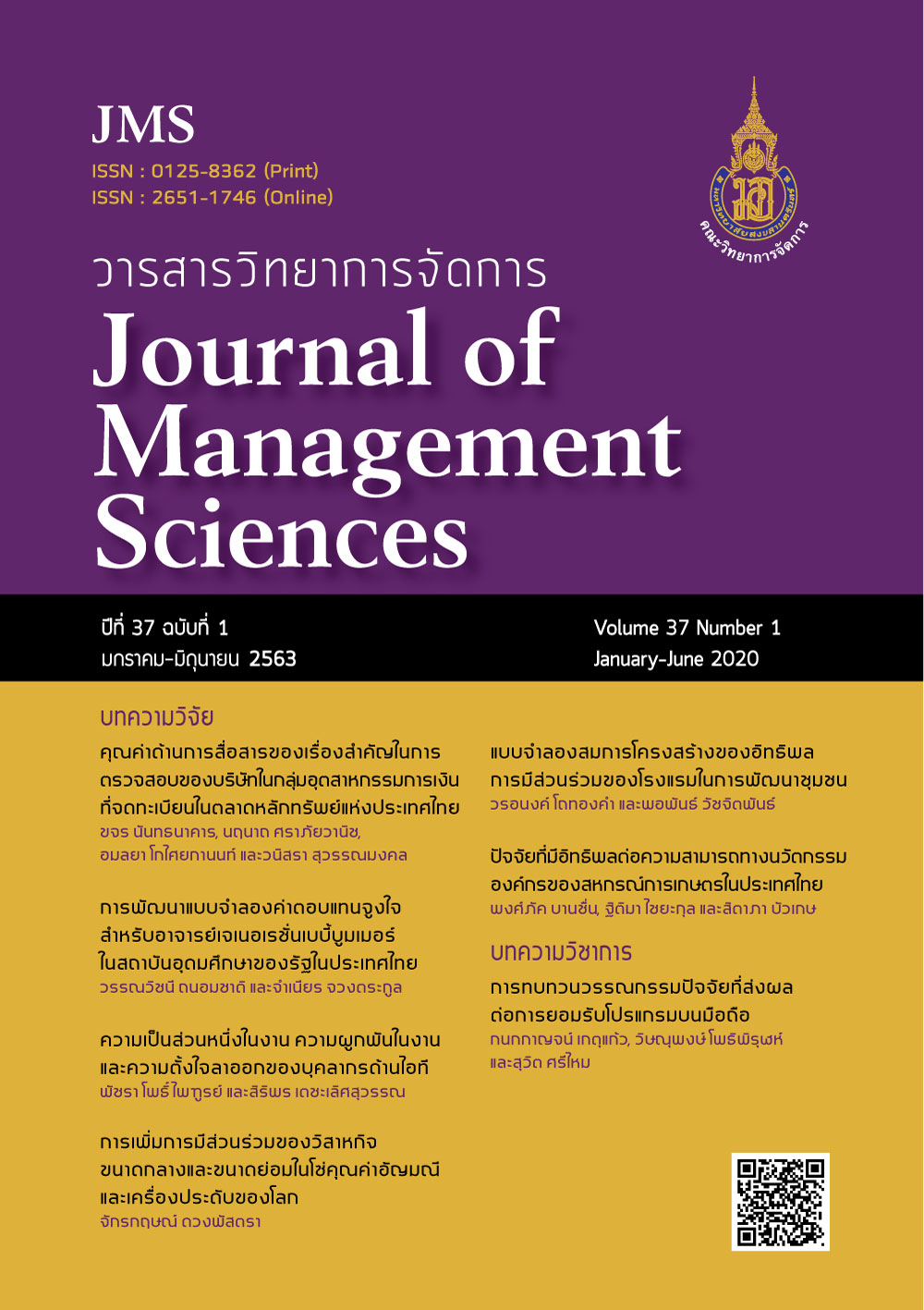The Development of an Incentive Pay Model for Baby Boomer Lecturers Working in Thai Public Higher Education Institutes
Main Article Content
Abstract
The purposes of this study are to develop and confirm an incentive pay model for lecturers from the Baby Boomer generation working in Thai public higher education institutes. The study was a mixed method approach using a sequential exploratory strategy. It was conducted by applying a grounded theory strategy. The qualitative data was collected through an in-depth interview with 32 informants. After development of the model, the questionnaires were created and collected with 400 samples, and received 318 responses (79.50%), then the study used a Confirmatory Factor Analysis (CFA) to confirm the acceptance of the model. The result from the interview reports that baby boomer lecturers prefer to receive their incentive compensation both as financial and non-financial incentives, including (1) allowances for academic and professional status, (2) research production funds, (3) academic paper production and publication funds, (4) allowances for administrative positions, and (5) freedom and flexible work hours. The result of the CFA test confirmed that the incentive compensation model fit well with the empirical data. The standard weight of all indicators displayed in this model were found to be statistically significant (P<0.001). It could be concluded that the model can be used to describe incentives’ compensation types for baby boomer lecturers working in Thai public higher education institutes. This can also be used to determine the appropriate incentive compensation programs to motivate and increase baby boomer lecturers’ performances for achieving universities’ goals.
Article Details

This work is licensed under a Creative Commons Attribution-NonCommercial-NoDerivatives 4.0 International License.
All published articles are SJMS’s copyright. The editorial board allows all published articles to be copied, excerpted, or disseminated with academic citation.
References
Amsuk, R., & Sukontamarn, P. (2016). Elderly Workers: Situation and Policy of Thailand. Journal of Politics and Governance, 6(1), 345-361.
Angsuchot, S., Wijitwanna, S., & Pinyopanoowat, R. (2011). Statistical Analysis for Research in the Social Sciences and Behavioral Sciences: LISREL Technique (3rd ed.). Bangkok: Charoen Dee Munkong Press.
Attanit., R. (2010). Compensation Management. Bangkok: HR Center.
Bentler, P. M., & Chou, C. H. (1987). Practical Issues in Structural Modeling. Sociological Methods & Research, 16(1), 78–117.
Berg, B. L. (2001). Qualitative Research Methods for the Social Sciences (6th ed.). Boston: Allyn and Bacon.
Chakrabortty, A., & Weale, S. (2016). Universities Accused of 'Importing Sports Direct Model' for Lecturers' Pay. Retrieved December 17, 2017, from https://www.theguardian.com/uk-news/2016/nov/16/universities-accused-of-importing-sports-direct-model-for-lecturers-pay
Cronbach, L. J. (1970). Essentials of Psychological Testing (3rd ed.). New York: Harper & Row.
Creswell, J. W. (2012). Educational Research: Planning, Conducting, and Evaluating Quantitative and Qualitative Research (4th ed.). Boston: Pearson Education.
Hair, J. F., Black, W. C., Babin, B. J., & Anderson, R. E. (2010). Multivariate Data Analysis (7th ed.). New Jersey: Pearson Education.
Hansen, J. I. C., & Leuty, M. E. (2012). Work Values Across Generations. Journal of Career Assessment, 20(1), 34-52.
Joungtrakul, J. (2010). Qualitative Research: Knowledge Creation Tools For National Development. Bangkok: Business Law Center International.
Khunmi, K. (2011). Strategic Compensation Management. Promoting and Developing Academic Documents Project, National.
Lamantia, F., & Pezzino, M. (2016). Evolutionary Efficacy of a Pay for Performance Scheme with Motivated Agents. Journal of Economic Behavior and Organization, 125, 107-119.
Milkovich, M., Newman, J., & Gerhart, B. (2014). Compensation (11th ed.). New York: McGraw-Hill.
Mondy, W. R. (2011). Human Resource Management (12th ed.). London: Pearson Higher Education.
Office of the Public Sector Development Commissiom. (2014). Strategy for the year 2008-2012: Strategic Issues 3 Incentive System: Annual Incentive Pay. Retrieved February 2, 2016, from http://www.opdc.go.th/special.php?content_id=267&spc_id=4
Office of the Higher Education Commission. (n.d.). Higher Education Institutions. Retrieved May 15, 2016, from http://www.mua.go.th/index_mua.html
Peterson, S. J., & Luthans, F. (2006). The Impact of Financial and Non-Financial Incentives on Business Unit Outcome Over Time. Journal of Applied Psychology, 91(1), 156-165.
Schumacker, R. E., & Lomax, R. G. (2015). A Beginner's Guide to Structural Equation Modeling (4th ed.). New York: Routledge.
Twenge, J. M., Campbell, S. M., Hoffman, B. J., & Lance, C. E. (2010). Generational Differences in Work Values: Leisure and Extrinsic Values Increasing, Social and Intrinsic Values Decreasing, Journal of Management, 36(5), 1117-1142.
The Comptroller General’s Department, Office of Legal Standards and Finance Regulations. (n.d.). Law and Regulations on Administrative Expenses. Retrieved April 15, 2016, from http://www.oic.go.th/FILEWEB/CABINFOCENTER18/DRAWER090/GENERAL/DATA0000/00000270.PDF
Weale, S. (2016). UK University Lecturers Strike over Pay. Retrieved April 21, 2017, from https://www.theguardian.com/education/2016/may/25/uk-university-lecturers-strike-over-pay
Wei, L. T., & Yazdanifard, R. (2014). The Impact of Positive Reinforcement on Employees’ Performance in Organizations, American Journal of Industrial and Business Management, 4(1), 9-12.
Zemke, R. (2000). Generations at Work: Management the Clash of Veterans, Boomers, Xers, and Nesters in your workplace. New York: AMACOM.

